|
De Vlaamse dichter Frédéric Leroy werd geboren op 2 december 1974 in Blankenberge. Zie ook alle tags voor Frédéric Leroy op dit blog.
A la très pieuse
Bij stilte. Bij regen en zon, het luiden van
klokken. Wanneer in duisternis een kaars
wordt aangestoken en jij een kruis slaat.
Bij sterfte en geboorte. Bij overdaad.
Bij god en bij duivel, zo ontsluit jij de dagen:
met vingervlugge kruistekens. Regenspatjes
op een vijver. Alsof je uit je lichaam draadjes
plukt waarmee je aan de hemel werd geregen.
Laat ons over het lijden zwijgen (het lijden
is link en reusachtig en heeft een eigen stem).
Dit mag genoeg zijn: de kinderlijke verbazing
en het kruis op je lippen, je borsten, je lippen.
Terug naar Eden
Een gifgroene tuin, de mieren, de maden,
een leistenen cirkel en het spietsen van de grond
met afgerukte takken, de van kippenbloed dronken,
daverende bodem en de grote, grijze man
met de bijl.
Ik dank je, grote, grijze man: het was
een wonderlijke, groene tuin, onze tuin,
een paradijs met bloedfonteinen. Ik doopte
twijgjes in rode plassen en was
een lachende kleuter.
En hier, waar het gras wat geler is: hier
stookte ik de eerste vuurtjes, verbrandde
droge, krakende bladeren, later alles
wat ik vinden kon. Hier was niets
dat bloemen droeg.
Ontbijtintimiteiten (ochtendfruit)
Met een frambozenmondje nip je van
een kopje groene thee, tevreden wip
je zachtjes op het topje van je stoel,
had je niet liever wat gebleven, ik
bedoel, wij tweeën in het beddengoed?
Jij likt de honing, ik de ochtendgloed
die de zondagmorgenzon lachend
in je haren spelen laat - mijn hand
strijkt doorheen de restjes slaap die daar
nog stiekem kleven: clandestiene sterren.
Maar zoveel aandacht doet je blozen, dus
gooi ik maar wat vrolijk ochtendfruit:
een fraaie donkerrode kersenregen,
een appel en een drietal abrikozen.
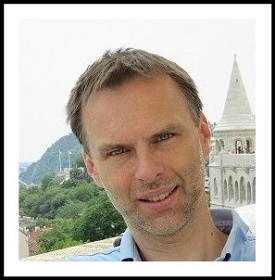
Frédéric Leroy (Blankenberge, 2 december 1974)
De Amerikaanse schrijfster Ann Patchett werd geboren in Los Angeles op 2 december 1963. Zie ook alle tags voor Ann Patchett op dit blog.
Uit: Commonwealth
“The children were seated across the aisle from one another, the boys on the left and the girls on the right, and each was given a set of junior airman wings, which only Cal refused to wear. They were glad to be on the plane, glad to be free of direct supervision for six hours. As much as they hated to leave their mother—they were unquestionably loyal to their mother—the four Cousins children thought of themselves as Virginians, even the youngest two, who had been born after the family’s move west. All of the Cousins children hated California. They were sick of being shoved down the hallways of the Torrance Unified School District. They were sick of the bus that picked them up on the corner every morning, and sick of the bus driver who would not cut them a break, even thirty seconds, if they were made late by Albie’s dawdling. They were sick of their mother, no matter how much they loved her, because she had on occasion cried when they returned to the house after missing the bus. Now she would be late for work. She went over it all again in the car as she drove them to school at terrifying speeds—she had to work, they couldn’t live on what their father gave them, she couldn’t afford to lose this job just because they weren’t responsible enough to walk to the goddamn corner on time. They blocked her out by pinching Albie, whose screams filled the car like mustard gas. More than anything they were sick of Albie, who had spilled his Coke all over the place and was at this very moment kicking the seat in front of him on the plane. Everything that happened was his fault. But they were sick of Cal too. He got to wear the house key on a dirty string around his neck because their mother told him it was his job to get everybody home after school and make them a snack. Cal was sick of doing it, and on most days he locked his sisters and brother out for at least an hour so that he could watch the television shows that he wanted to watch and clear his head. There was a hose on the side of the house and shade beneath the carport. It wasn’t like they were going to die. When their mother came home from work they met her at the door screaming about the tyranny of their situation. They lied about having done their homework, except for Holly, who always did her homework, sometimes sitting Indian-style under the carport with her books in her lap, because she lived for the positive reinforcement her teachers heaped on her. They were sick of Holly and the superiority of her good grades. Really, the only person they weren’t sick of was Jeanette, and that was because they never thought about her. She had retreated into a silence that any parent would have asked a teacher or a pediatrician about had they noticed it, but no one noticed. Jeanette was sick of that.”
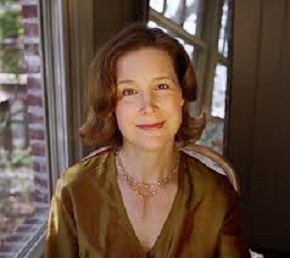
Ann Patchett (Los Angeles, 2 december 1963)
De Nederlandse dichter en schrijver Hein (Hendrik Jan) Boeken werd geboren in Amsterdam op 2 december 1861. Zie ook alle tags voor Hein Boeken op dit blog.
Herfst
En in de lucht des vochten uchtends hangen
De laatste dunne blaad'ren van het jaar,
Als in het zwarte takkennet gevangen,
Met fijne glans van kleuren naast elkaar.
Zo louterde de pracht zich van de lange
En luide lichttijd en de brede schaar
Van groengedoste bomen, tot die bange
En tere lichtkleur van het late jaar.
Die blaadren schenen mij een vreemd gezicht
Van schone zielen uit veel enge pijn
En godgelijk genot alhaast gevlucht.
Hun laatste middag komt met zomerschijn
Van gouden stralen uit de hoge lucht
En drupplen tintlend in het laatste licht.
Narcissus of water-spiegeling in Amsterdam
Waar water is, wordt alles opgetild.
0 zie die waatren eens rechtlijnig schieten
De brug door tot zo welige verschieten
Dat graft-laan lijken gaat een woud-laan mild
En midde' in stad als eenzame woud-stilt'.
Wat zo de leste wolkjes daarin lieten
Voor donkre diept' haar leste blos verschieten
Eer nog een huivring over 't licht vlak rift?
De hemel kijkt tot onder in de stad.
De hemel kijkt weer uit de diept' naar boven,
Alsof de stad haar fundamenten had
Ver in het diep der hemelse licht-hoven.
ZO strekk' mijn ziel der wereld tot een bad,
Welks waatren niet haar hemel-lichten doven!
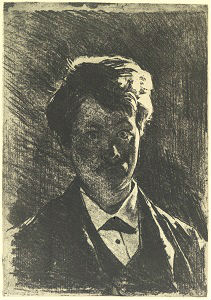
Hein Boeken (2 december 1861 – 19 oktober 1933)
Portret door Willem Witsen, 1891
De Amerikaanse schrijver Thomas Coraghessan Boyle werd geboren op 2 december 1948 in Peekskill, New York. Zie ook alle tags voor T. C. Boyle op dit blog.
Uit: The Tortilla Curtain
“He was about to give it up and jog to the lumberyard for help, for the police, an ambulance--they'd know what to do--when a glint of light caught his eye through the scrim of brush. He staggered forward blindly, stupidly, like a fish to a lure--he wanted to do the right thing, wanted to help, he did. But almost as quickly, he caught himself. This glint wasn't what he'd expected--no coin or crucifix, no belt buckle, key chain, medal or steel-toed boot wrenched from the victim's foot--just a shopping cart, pocked with rust and concealed in the bushes beside a rough trail that plunged steeply down the hillside, vanishing round a right-angle bend no more than twenty feet away.
Delaney called out again. Cupped his hands and shouted. And then he straightened up, wary suddenly, catlike and alert. At five-foot-nine and a hundred and sixty-five pounds, he was compact, heavy in the shoulders and with a natural hunch that made him look as if he were perpetually in danger of pitching forward on his face, but he was in good shape and ready for anything. What startled him to alertness was the sudden certainty that the whole thing had been staged--he'd read about this sort of operation in the Metro section, gangs faking accidents and preying on the unsuspecting, law-abiding, compliant and fully insured motorist . . . But then where was the gang? Down the path? Huddled round the bend waiting for him to take that first fatal step off the shoulder and out of sight of the road?
He might have gone on speculating for the rest of the afternoon, the vanishing victim a case for Unsolved Mysteries or the Home Video Network, if he hadn't become aware of the faintest murmur from the clump of vegetation to his immediate right. But it was more than a murmur--it was a deep aching guttural moan that made something catch in his throat, an expression of the most primitive and elemental experience we know: pain. Delaney's gaze jumped from the shopping cart to the path and then to the bush at his right, and there he was, the daredevil, the suicide, the jack-in-the-box who'd popped up in front of his bumper and ruined his afternoon. The man was on his back, limbs dangling, as loose-jointed as a doll flung in a corner by an imperious little girl. A trail of blood, thick as a finger, leaked from the corner of his mouth, and Delaney couldn't remember ever having seen anything so bright. Two eyes, dull with pain, locked on him like a set of jaws.”
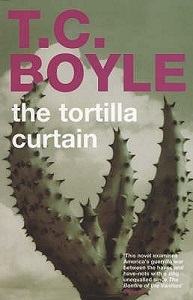
T. C. Boyle (Peekskill, 2 december 1948)
Cover
De Amerikaanse schrijver George Saunders werd geboren op 2 december 1958 in Chicago. Zie ook alle tags voor George Saunders op dit blog en ook mijn blog van 2 december 2009.
Uit: Lincoln in the Bardo
“Yesterday around three there came a considerable procession— perhaps twenty carriages and nowhere to put them— They stopped on the lawns of the houses and sat aslant on the cemetery land by the fence— And who should alight from the hearse but Mr. L. himself, whom I could recognize from his likeness— But sore bent down and sad in countenance, almost needing to be urged along, as if reluctant to enter that drear place— I had not yet heard the sad news & was momentarily puzzled but soon enough the situation being made clear I prayed for the boy & family— it has been much in the papers regarding his illness and it has had the unhappy outcome now— The carriages cont’d to arrive over the next hour until the street was impassable.The large crowd disappeared inside the chapel and from my open window I could hear the proceedings within: music, a sermon, weeping. Then the gathering dispersed & the carriages moved off, several becom-ing stuck & requiring unsticking, the street & lawns being left a consid-erable mess.Then today, again wet & cold, and, around two, a single small car-riage arrived & stopped at the cemetery gate & again the President got out, this time accompanied by three gentlemen: one young & two OLD.— they were met at the gate by Mr. Weston & his young assistant & all went off to the chapel— Before long, the assistant being joined by a helper, they were seen to be managing a small coffin on to a handcart & off the sad party went, cart in the lead, the President & his compan-ions plodding along behind— their destination appeared to be to the northwest corner of the cemetery. The hill there being steep and the rain continuing, it made a strange joining of somber melancholy & riotous awkwardness, the assistants struggling to keep the tiny coffin upon the cart— & at the same time all parties, even Mr. L., diligently mincing to maintain their footing on the rainslick grass.Anyway it appears the poor Lincoln child is to be left there across the road, contrary to reports in the newspapers, which ventured that he would be returning to Illinois forthwith.”

George Saunders (Chicago, 2 december 1958)
Cover
De Duitse schrijver Botho Strauß werd geboren op 2 december 1944 in Naumburg an der Saale. Zie ook alle tags voor Botho Strauß op dit blog.
Uit: Drüben
“Hinter dem Fenster sitzt sie, es ist Sonntagnachmittag, und sie erwartet Tochter und Schwiegersohn zum Kaffee. Der Tisch ist seit langem für drei Personen gedeckt, die Obsttorte steht unter einer silbernen Glocke. Die alte Frau hat sich nach dem Mittagsschlaf umgezogen. Sie trägt jetzt ein russischgrünes Kostüm mit weißer Schluppenbluse. Sie hat ein Ohrgehänge mit Rubinen angelegt und die Fingernägel matt lackiert.
Sie sitzt neben der aufgezogenen Gardine im guten Zimmer, ihrem “Salon", und wartet. Seit bald vierzig Jahren lebt sie in dieser Wohnung im obersten Stockwerk eines alten, ehemaligen Badehotels. Die Zimmer sind alle niedrig und klein und liegen an einem dunklen Flur. Sie blickt durch ihr Fenster auf den Kurgarten und den lehmfarbenen Fluss, der träg durch den Ort zieht und ihn in zwei einander zugewandte Häuserzeilen teilt, in ein stilles, erwartungsloses Gegenüber von Schatten- und Sonnenseite. Auf der Straße vor dem Haus bewegt sich nur zäh der dichte Ausflugsverkehr.
Sie hält den Kopf aufgestützt und ein Finger liegt auf den lautlos sprechenden Lippen.
Nun wird sie doch ein wenig unruhig. Sie steht auf, rückt auf dem Tisch die Gedecke zurecht, faltet die Servietten neu, füllt die Kaffeesahne auf. Setzt sich wieder, legt die Hände lose in den Schoß. Wahrscheinlich sind sie in einen Stau geraten ...
Sie kommt in Gedanken und muss sich ablenken. Aus der Truhe holt sie die Häkeldecke, setzt die Brille auf. Doch das Warten ist stärker, es fordert, dass man sich still verhält, damit nichts Schlimmes passiert ist. Sie legt die angefangene Decke beiseite und blickt wieder hinaus auf den Fluss.
Am anderen Ufer, ihr gerade gegenüber, steht eine behäbige Gründerzeitvilla, etwas unförmig geworden durch etliche Erweiterungsbauten. In früherer Zeit der Ruhesitz eines berühmten Wagner-Sängers, stand sie lange baufällig und leer, bis vor wenigen Jahren ein Altersheim darin eingerichtet wurde“.
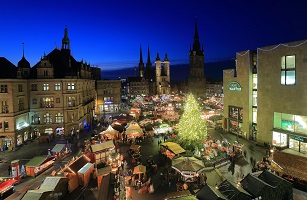
Botho Strauß (Naumburg, 2 december 1944)
Naumburg in de aanloop naar Kerstmis
De Franse schrijver Jacques Lacarrière werd geboren op 2 december 1925 in Limoges. Zie ook alle tags voor Jacques Lacarrière op dit blog.
Uit: Les Gnostiques
« À dix-huit siècles de distance, la parole et l'exemple des gnostiques demeurent toujours aussi décapants. Avec ses tueries absurdes, ses violences quotidiennes, ses programmes d'abrutissement collectif, le monde d'aujourd'hui légitime au plus haut point le refus absolu que lui opposaient déjà ces lointains rebelles. Pour eux, une création pareillement ratée ne peut être le produit que d'un Dieu méchant, un Dieu ennemi de l'homme. "Viscéralement, impérieusement, irrémissiblement, note Lacarrière, le gnostique ressent la vie, la pensée, le devenir humain et planétaire comme une œuvre manquée, limitée, viciée dans ses structures les plus intimes. (...) Mais cette critique radicale de toute la création s'accompagne d'une certitude tout aussi radicale, qui la suppose et la sous-tend : à savoir qu'il existe en l'homme quelque chose qui échappe à la malédiction de ce monde, un feu, une étincelle, une lumière issue du vrai Dieu, lointain, inaccessible, étranger à l'ordre pervers de l'univers réel, et que la tâche de l'homme est de tenter, en s'arrachant aux sortilèges et aux illusions du réel, de regagner sa patrie perdue, de retrouver l'unité première et le royaume de ce Dieu inconnu, méconnu par toutes les religions antérieures."
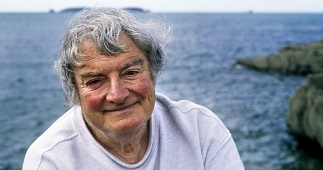
Jacques Lacarrière (2 december 1925 - 17 september 2005)
De Griekse dichter en schrijver Iakovos Kampanellis werd geboren op 2 december 1922 in Hora op het eiland Naxos. Zie ook alle tags voor Iakovos Kampanellis op dit blog en ook mijn blog van 2 december 2010.
Antonis
Da drüben auf der breiten Treppe
Dort auf der Treppe der Tränen
Dort in den tiefen Gruben
Dort im Steinbruch der Klagen
Laufen Juden und Partisanen
Und fallen Juden und Partisanen
Felsbrocken schleppend auf den Schultern
Felsbrocken, Zeichen des Todes.
Und dort hört Antonis eine Stimme
Und diese Stimme ruft:
“Ach, Kamerad, ach, Kamerad
Hilf mir, die Treppe zu steigen!”
Doch dort auf dieser breiten Treppe
Dort auf der Treppe der Tränen
Ist solche Hilfe nur Verwünschung
Fluch ist dort jegliches Mitleid.
Der Jude, er fällt dort auf der Treppe
Blutrot färbt sich die Treppe.
“Du, kräftiger Kerl, so komm doch her
Trag’ du die doppelte Last.”
“Ich nehme zwei, ich nehme drei
Ich bin es doch, bin Antonis
Ich sage dir: wenn du ein Mann bist
Komm auf den marmornen Dreschplatz.”
Vertaald door Helmut Schwäbl
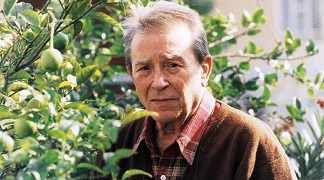
Iakovos Kampanellis (2 december 1922 - 29 maart 2011)
De Amerikaanse schrijver Eric L. Harry werd geboren op 2 december 1958 in Ocean Springs, Mississippi. Zie ook alle tags voor Eric L. Harry op dit blog en ook mijn blog van 2 december 2009.
Uit: Protect and Defend
“Pyotr Andreev carried the rolled carpet through the perekhod. He used the dark, underground pedestrian tunnel even though the city boulevard above was barren of traffic. The air reeked of urine and of the unwashed men who lined the walls. It looked like the permanent residence of people driven underground by the terrors of the streets.
Pyotr suddenly saw two men framed in the bright sunlight from the stairs toward which he headed. They strolled slowly — walking side by side — approaching him from the Red Square exit. They both wore jack boots, and one swung a baton. Against the backlighting, he saw only their shapes… and the two machine pistols they carried. The guns dangled from straps hung over their shoulders.
Andreev had to make a choice. To lie down in the filth with the dregs of society? Or stroll calmly past the two men? A man coughed, and Pyotr stole a quick glance at him. His weathered face and matted beard resolved his conflict. Pyotr knew he would stand out among such men.
He shifted his grip on the large roll. In the process, his right hand moved nearer his Ingram. He could hand over the heavy load to the Black Shirts. As they reacted in surprise at its weight, he’d extract the Mac-10, flick the safety, and kill them both.
And his mission would be aborted one day short of completion.
A flashlight shone straight into his eyes. Andreev halted and rested the carpet on its end. When the beam ran down the roll, Pyotr’s eyes began to adjust to the darkness. One of the men wore the black garb of the anarchists. The other wore a garrison cap with a shiny brim — a policeman. The incredible rise in street violence had forced a police recall. Pairs like this one were now a common sight in Moscow. But the Black Shirt was there to keep an eye on the cop. He could act with impunity while the cop walked a fine line."

Eric L. Harry (Ocean Springs, 2 december 1958)
Zie voor bovenstaande schrijvers ook mijn blog van 2 december 2008 en ook mijn blog van 2 december 2007 en mijn blog van 2 december 2006.
|



